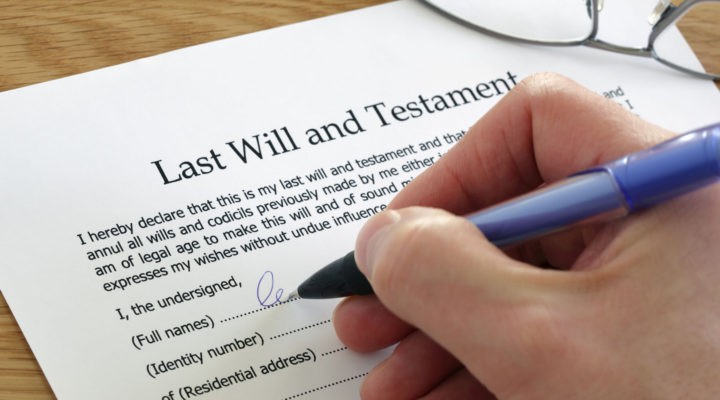New research showing that 46% of U.S. adults have wills directing the distribution of their estates after death hardly came as a surprise to David King, director of the Lake Institute on Faith and Giving at Indiana University.
“That percentage of Americans sounds about right to me. If anything, I might have imagined it even being a bit lower,” King said of the Gallup survey released June 23.
Nor was it especially hard to believe the data showing that the likelihood of having a will increases with age.

David King
“As might be expected, Americans aged 65 and older are the most likely subgroup to have a will, with just over three-quarters saying they have one,” Gallup reported. “Each younger age group is significantly less likely to have a will than the previous one, including just 20% of adults under age 30.”
While the poll doesn’t speak to where Americans are bequeathing their assets, King and other experts say it is far too seldomly directed to churches and nonprofits.
But that, King said, largely can be laid at the feet of clergy and lay leaders who could do much more to educate congregations about the opportunities and benefits of dedicating estates to religious communities.
“Often, many churches and many faith-based nonprofits have neglected estate planning. While most churches turn their attention to their regular stewardship appeals, annual fundraising campaign, or even capital campaigns for buildings and programs, they have often missed the important funding stream of bequests,” he said.
King said he’s heard too many stories about long-time church members who tithed faithfully for decades, only to leave the bulk of their estates to libraries, animal shelters and other favorite causes — neglecting their beloved churches. “Of course, these organizations also do important work, but the point is that the church often never asks their members to consider them in their estates, but these other organizations did.”
“Often, many churches and many faith-based nonprofits have neglected estate planning.”
And the trend cannot be pinned on young adults, he added. “I don’t think legacy giving is necessarily generational even if it is apparent that we have a declining trust in institutions,” King added. “It is clear that congregations and nonprofits must do a better job in making their case as to why they are a worthy long-term investment for a major gift or bequest.”
That means tweaking the message to younger Christians, he said. “Just an appeal to a donor with the hope of ensuring the building or music ministry is still here in 50 years will not work going forward. An appeal for a gift to maintain a historic building to maintain a presence for ministry in a particular local community — with a fresh approach to innovative mission and resource development — may be appealing to a younger donor.”
But whether the focus is on older or younger churchgoers, it is essential that the message about estate planning is intentional and consistent, according to the Evangelical Council for Financial Accountability.
“Most churches and ministries today aren’t making the most of planned giving opportunities with donors. It’s just that simple,” ECFA said in an online article. “Why? In many cases, we feel intimidated or just don’t know where to start.”
Beyond current giving, congregations should explore gifts through wills and trusts and from beneficiary gifts from sources such as life insurance policies and retirement accounts, the council said.
But that requires consistency with messaging, ECFA said. Research has shown many donors do not include churches in estate planning because they “have simply not thought about it” and have not “been presented with the opportunity. It is so important to regularly communicate (possibly weekly or monthly) about ways that constituents can benefit your ministry.”
Details about giving opportunities may be provided through giving-related seminars and be added to ongoing stewardship campaigns, the council advises. “Planned giving should not be ‘siloed’ from the rest of the development and stewardship effort.”
King said it’s common for most people to make a will only when they are ready to do so. Congregations should be ready for those moments by creating top-of-mind awareness about options for giving.
“Most churches and ministries today aren’t making the most of planned giving opportunities with donors. It’s just that simple.”
“You might include it as a note in the bulletin, newsletter or mailing. You might leave information in the narthex or lobby — areas where people could quickly take information with them. Then they are reminded of the church or your nonprofit as an opportunity to give when they are ready to address the issue.”
Establishing relationships with financial experts also can help communities of faith boost planned giving.
“Local financial advisors, particularly those that might understand faith and the religious landscape, can also be great resources in helping clergy or nonprofit leaders with the expertise that few of us have,” he said. “Pastors need not have the skills to set up a charitable remainder trust, but they should be familiar with the term and know who to call when a member of their church asks them how the church might be able to use a legacy gift.”
However, few are better situated to help church members work through the difficult financial and emotional considerations involved in estate planning than trusted religious leaders, King said.
“While congregations have often missed the opportunity to ask their members to consider their legacy by giving through their estate, who else is better equipped to talk with those entrusted to their care about the ultimate questions of values, meaning and legacy?” he said. “Clergy are well equipped to listen, lead and ask discerning questions to help their congregants reflect on how they might invest their resources today and beyond their life. This is a major asset that religious leaders bring to this work.”
Editor’s note: Learn more about legacy giving to BNG, your church or other nonprofits by exploring the Planned Giving section of BNG’s website.


